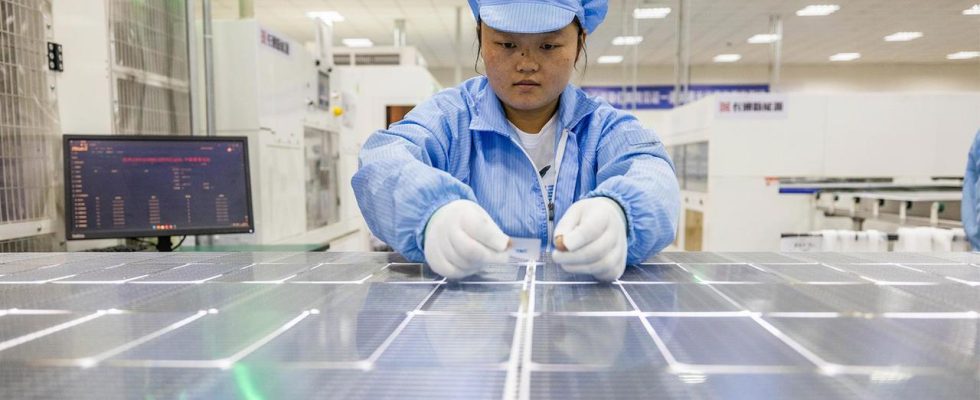analysis
Machines, cars, car parts – all products that once made Germany the world export champion. But then came China. The flood of exports from there makes products cheaper – but puts a strain on domestic companies.
In 2008, Germany was able to defend its status as world export champion for the last time. Since then, China has continued to expand its lead over the European Union and Germany. For every container of EU goods for China, there are currently three and a half containers of Chinese goods for the EU. They are filled primarily with future technologies such as electric cars, solar modules, wind turbines, but also with cheap clothing and plastic products, such as those from the Temu shopping platform.
These products have one thing in common: they are cheaper than competing European products, which has long been noticeable in Chinese electric cars, for example. After three price cuts within a few months, the basic model from the manufacturer BYD now costs just under 30,000 euros in the basic version, making it around 3,000 euros cheaper than the comparable model from VW, the ID.3.
Call for help from the solar industry
A similar picture emerges in the solar industry. For weeks, European manufacturers have been warning about a shutdown of production and the end of their industry. They are calling for emergency political measures, such as buying up excess stocks in Europe. In the solar industry, too, the products of Chinese manufacturers are cheaper than those of Germans or Europeans, as surveys by economic research institutes make clear.
“Various comparisons of different modules from recent years show that the modules from European or German manufacturers are around 20 to 30 percent more expensive than the Chinese products,” explains Andreas Fischer, climate expert at the German Economic Institute (IW) in Cologne.
Government aid as a boost
There are many reasons for the low prices from China, explains Fischer. Thanks to long-standing and generous government subsidies, Chinese companies can produce cheaply and, above all, in large quantities. “Over the last ten to 15 years, the Chinese state has made it possible to set up solar giga factories with generous subsidies, whose production capacities are generally at least ten times larger than in Europe.”
When it comes to solar modules alone, China could currently meet global demand two and a half times. In China, manufacturers are currently sitting on gigantic overcapacity because the Chinese economy is weakening and the severe real estate crisis is putting pressure on the Chinese consumer mood. The domestic market is largely at a standstill, which is why industrial groups sell their products abroad at dumping prices.
An unpleasant déjà vu
The solar industry in Germany has already experienced what a flood of cheap goods from China can lead to. More precisely, in the 2000s, when China also flooded the European market with cheap solar products – and thus destroyed it. In the years that followed, China became the dominant solar state by building gigantic solar factories and exporting its products all over the world.
“China now has a market share of 80 percent for both solar modules and individual components,” says Fischer. This triggered a real decline in prices: “In Germany, prices for solar systems collapsed by 90 percent between 2006 and 2023.”
Consumers initially benefit
For Germany and the EU, the glut of goods is ambiguous: For consumers, an energy transition with the help of solar systems and electric cars will become more affordable and perhaps even possible. In addition, the lower prices of Chinese products in this country are dampening inflation and taking the pressure off central banks to combat price increases with continued high interest rates.
However, a permanent price war with constantly new discount battles would put a long-term burden on German companies and thus on the economy. Jens Secker, company spokesman for the photovoltaic provider Solarwatt, describes what the price pressure means in the case of the solar industry: “The prices for solar modules have fallen by around 60 percent since the middle of last year, and at some point European producers will no longer be able to represent that. If there is no If politicians make quick decisions, there will no longer be any relevant production capacities in Germany and Europe in the near future.”
In competition with China, more competition controls and trade barriers such as tariffs have long been discussed in the EU. However, if there are import restrictions, China is already threatening countermeasures.

